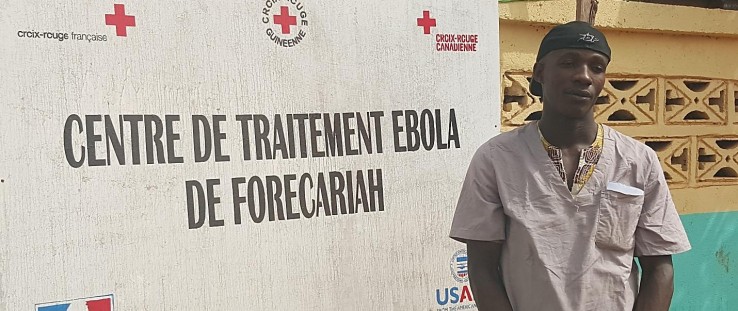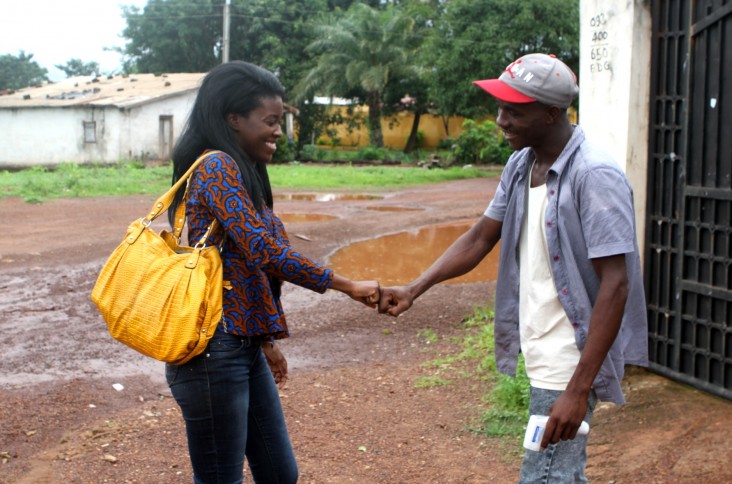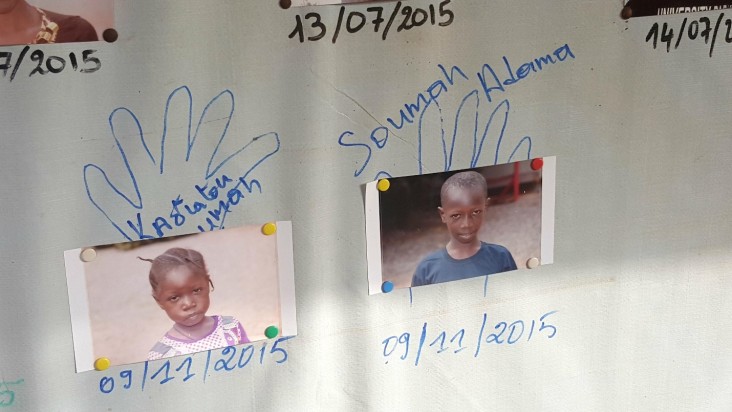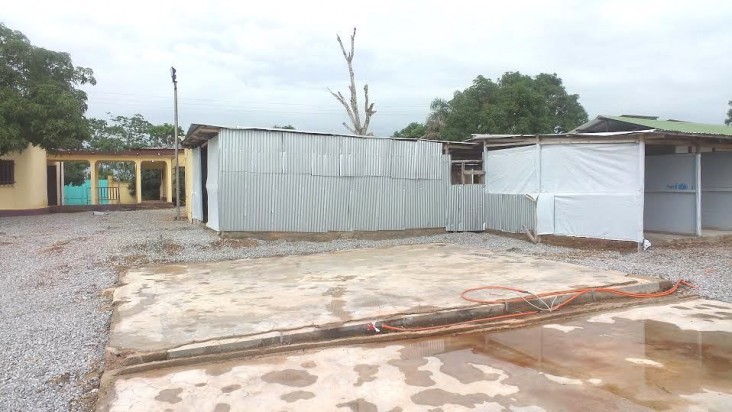 Alseny Touré works at the French Red Cross site near the Ebola Treatment Unit in Forécariah, Guinea.
Mariama Keita, USAID
Alseny Touré works at the French Red Cross site near the Ebola Treatment Unit in Forécariah, Guinea.
Mariama Keita, USAID
 Alseny Touré works at the French Red Cross site near the Ebola Treatment Unit in Forécariah, Guinea.
Mariama Keita, USAID
Alseny Touré works at the French Red Cross site near the Ebola Treatment Unit in Forécariah, Guinea.
Mariama Keita, USAID
Speeches Shim
CONAKRY, Guinea—On a sunny morning in early March, I jumped into the back of an SUV and traveled for over two hours to visit an Ebola Treatment Unit (ETU) in the Forécariah prefecture in the Kindia region of Guinea in West Africa. Accompanied by a USAID team of disaster specialists, it was business as usual navigating through Conakry, the capital and largest city of Guinea—passing children walking to school, market women selling their produce, and horns honking for city dwellers on foot to move out of the way of moving traffic. The roads jolted our bodies from side to side non-stop, unlike in Guinea’s rural settings, which are filled with tropical trees and mini lakes that exude a feeling of peace and tranquility.
As I continued to stare out of the back seat window and observe roadside activities, it was hard to imagine that two years had passed since this Francophone West African nation lost 2,536 lives to the Ebola virus and precipitated a global humanitarian crisis.
After a long journey, I eagerly walked into the empty ETU in Forecariah, which was supported by USAID and managed by the French Red Cross. Staffers were wearing protective gear as they cleaned and decontaminated the entire unit. During the peak of the epidemic, this ETU screened more than 360 people and admitted approximately 290 patients as suspected Ebola cases. Officially, operations ended on Feb. 29, but the ETU can be reactivated within 48 hours if a future outbreak occurs. Its last two survivors were siblings under the age of 5 who were released in November 2015.
During our lunch break, Dr. Linda Mobula, public health and infectious disease adviser in USAID’s Office of U.S. Foreign Disaster Assistance (OFDA), shared her experiences on what life was like working in a former Ebola unit and attending to the needs and demands of a global health crisis. Over a plate of delicious grilled fish, she casually revealed she was responsible for treating and taking care of Ebola’s most famous American survivor, Dr. Kent Brantly.
“I administered his supportive care which included his daily medications—antibiotics, antimalaria pills and fluids to ensure he received appropriate hydration. I also administered his first dose of Zmapp, an experimental drug, as his clinical status deteriorated,” explained Dr. Mobula.
As one medical professional to another, she wanted to make sure that Brantly, as one of the first providers to care for Ebola patients, would live to see his family again. His wife, Amber, and two children would call him every day. “I remember being in tears as his daughter sang to him on the phone one day,” said Dr. Mobula. “I didn't want to be the one to announce to the world that he had succumbed to Ebola.”
Survivor’s Story
About an hour after our arrival our guided tour came to an end, but standing by the exit was a young man named Alseny Touré, a well-known Ebola survivor from the village of Bêta in the prefecture of Forécariah.
Dr. Mobula immediately introduced us and I greeted him by saying “Arabakhidi,” which means “how are you” in Susu, the main local language and dominant ethnic group in Forécariah.
Alseny smiled with excitement, and we quickly found a room in one of the back offices to conduct an interview.
On Dec. 2, 2014, Alsenay’s life changed forever. He returned from Gambia from a fishing project and was informed that his aunt, Aminata Camara, had been sick the past four days. She was taken from her village Sinkinè to the hospital in Forécariah, where she spent only one night after being diagnosed with Ebola.
“My family suspected that the hospital was about to alert authorities. They removed her and took her to traditional healers,” said Alseny.
The family’s decision, which was based on cultural practices, likely cost Aminata her life, and she died, as well as 15 other members of Alseny’s family—his father, mother, wife, brother and sisters. As my heart hit the floor, he continued by saying, “Only six people survived, including my four kids.”
There were more than 2,000 Ebola-infected people in Forécariah and, in Alseny’s village of Bêta alone, 79 died. As Ebola continued to wipe out entire families, Alseny described how those houses remained closed and nobody dared to open their doors. Building trust and understanding around Ebola within communities has been an ongoing process.
“I am a fisherman who lost everything. My boat was my main source of income and because of stigma, I was forced to leave Bêta, my own village,” Alseny explained.
He decided not to become a victim of his circumstances and wanted to help kick Ebola out of his country. Once he was declared Ebola-free on Dec. 24, 2014, the National Ebola Coordination Unit recommended him to the French Red Cross, where he held a series of jobs ranging from taking care of children in the ETU to conducting Ebola awareness, social mobilization and community sensitization trainings. His jobs with the French Red Cross gave him hope—a sentiment that would prove necessary once again.
Post-Ebola
Within several days after my return to Washington, D.C., in early 2016, Ebola flare-ups began in Guinea’s Forest Region. Public health officials determined that, more than a year after recovery, Ebola survivors can still transmit the virus through bodily fluids, particularly semen.
With nearly 1, 270 Ebola survivors in the country, OFDA implemented community-based surveillance projects, or CEBSs. Currently, USAID supports three significant CEBS initiatives in Guinea through a consortium of four partners: International Medical Corps, Première Urgence-Aide Médicale Internationale, the Alliance for International Medical Action, and Plan International. Since February 2016, the groups have coordinated medical, psychosocial and livelihood support for Ebola survivors in Guinea.
It is quite possible that all three Ebola countries—Guinea, Liberia and Sierra Leone—will continue to experience flare-ups. On June 1, the World Health Organization declared Guinea Ebola transmission-free for the second time, as 42 days had passed since the last person was confirmed to have tested negative for Ebola.
As USAID and other development partners entered into the post-Ebola recovery period in 2016, two months had passed since I met Alseny. I was looking forward to my return to Guinea in May so I could reconnect with him.
On July 5, the eve of Eid, which marks the ending of Ramadan, USAID colleague Ousmane Conde and I surprised Alseny with a call from our office in Conakry.
Our conversation was filled with laughter as he talked of taking his children to the doctor for a medical check-up and other routine duties of fatherhood. I was happy to learn that he still had a job with the French Red Cross. While very pleased about this development, he reminded me that he continues to suffer emotionally and has not recovered from the loss of his wife. Alseny explained that he finds comfort by dreaming about his mother and father, and the happy times they shared together playing with their grandchildren.
Though his life has been riddled with tragedy, he inspires others by his drive, high spirits and gratitude. “I am thankful to all the partners that came to help during the Ebola response, especially USAID, which did a lot for me,” he said. “Now, I am ready to start a new life and leave Forécariah for Conakry, possibly, but will need financial assistance.”
As I departed Guinea and returned to Washington in August, I hoped his wishes would come true.





Comment
Make a general inquiry or suggest an improvement.